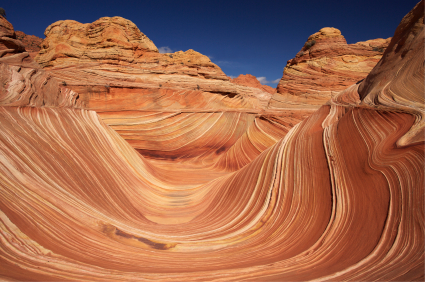I know what you might be thinking- rocks? Those pieces of stone and dirt- what could be interesting about them? That's what I've always though too- that rocks are boring and useless. But in reality, the rocks present on Earth can tell us tons of information about how our planet was many billion years ago and even how the Earth formed! So buckle in, everyone, we're going on a grand adventure through time, not space, as the oldest rocks ever may have just been found- right here in Canada!

https://sierraclub.org/sierra/2012-5-september-october/green-life/green-life/9-must-see-natural-rock-formations
It was previously though that all of the rocky material from the initial stages of our planet were lost to time and geologic processes such as plate tectonics and earthquakes. However, that may not be the case! Recently, 2.7 billion year old rocks have been discovered in northeastern Canada by Richard Carlson of the Carnegie Institution for Science in Washington, D.C. This may not sound very cool (it didn't to me at first :) ) but these rocks contain a large amount of neodymium only possible if these rocks are from 4.2 billion years ago, early in Earth's history. This means that plate tectonics did not destroy all early rocks as previously thought. That could even mean there were no earthquakes in the early life of Earth (it's probably more complicated than than but let's be optimistic, shall we?)
http://internetlooks.com/globaltempchange.html
I don't know about you guys but I think that's enough about rocks and plate tectonics for now. Let's take a look at Earth billions of years ago. The picture on top may look like some planet billions of light years away that life could never possibly exist on. Well, guess what? This is Earth. Yep, this gigantic ball of fire and rock is the place we call home! Can you believe it? Who would have ever thought this ball would one day support life? Apparently, minerals trapped within microscopic zircon crystals from this eon (known as the Hadeon Eon) reveal that Earth may even have contained liquid water way back then and was not the hell we may think it to be. This is an artist's depiction of a more possible picture of our planet during that time:
http://www.space.com/26685-early-earth-bombardment-water-oasis.html
Yeah, I know what you're thinking. This planet, with its blue waters and landmasses, doesn't look that much different from our modern world. But you wouldn't survive for very long back then anyhow. Any life that did exist then would have evolved resistant to the very harsh conditions. The main reason we have very few rock samples from that eon is because Earth and other nearby planets were repeatedly hit by large collision and this buried our planet in large volumes of molten rock (which results in the formation of new igneous rocks as you know :) but it does end up destroying what could be useful pictures of the past of our homeland. The good news is, though, that there may have been large time gaps between these collisions where water vaporized near these extremely hot areas and rained back down to Earth as wait for it... liquid water. So, I'm not 100% sure about this but the same collisions that destroyed rock evidence from the Hadean Eon may have been the key to our existence. Mind bowing, right?
But what does this all mean? Yeah, the early Earth was not as bad as we thought. It had liquid water, we don't have rock evidence, but so what? Well, I think perhaps these new discoveries of our own planet could be applied towards other planets in our universe. Far away planets that seem inhabitable now may be a completely different story a billion years from now. All that talk about Goldilocks zones? Well, Goldilocks can grow up and change, right? She isn't always going to be afraid of bears and these planets may not always be afraid of life either! After all, would you have wanted to take your chances on Earth 4 billion years ago? Uh huh, probably not! I'm not saying we should all pack up and move from Earth but some planets may surprisingly support life in the far future. And this is all assuming that life has the same meaning elsewhere in the universe too. I mean, life and death may be concepts that only exist on Earth. Something entirely different may be in other places! 😉 Head exploded yet?
http://www.dailymail.co.uk/sciencetech/article-3627752/Is-haven-t-alien-life-Experts-claim-extraterrestrials-die-young-planets.html
Thanks for coming with me on this fantastic voyage through time. The things you learned today may change our world for the better (or at least give you some good memories!) As we are zooming back towards 2017, I want you to ponder one thing: if something as boring as rocks could reveal so much about our planet and our existence, what could all the fascinating phenomena in our universe divulge? We will never know everything about our past, but the more we learn, the more we can predict our future.
As for whether humans will exist billions of years from now, that's a question we may never be able to answer. Wait, I got it! This plagioclase feldspar tells me that humans will ... Aaaaaaah!!!!!
https://www.sciencenews.org/article/remnants-earths-original-crust-preserve-time-plate-tectonics?mode=topic&context=60
http://www.space.com/26685-early-earth-bombardment-water-oasis.html
